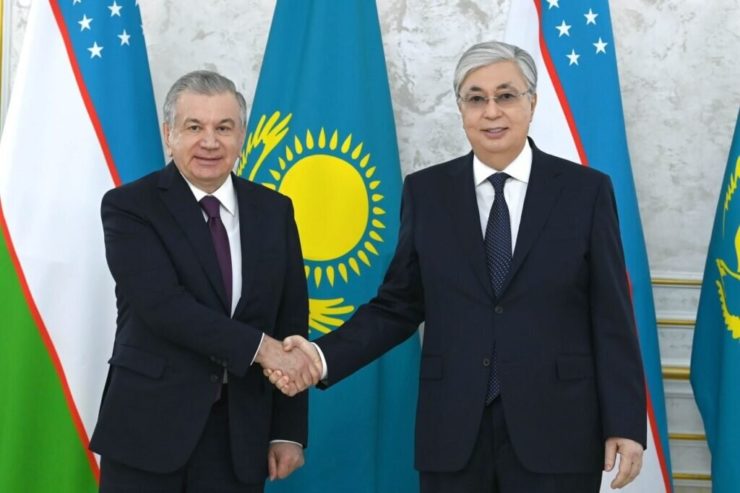
On April 5, 2024, President of Kazakhstan Kassym-Jomart Tokayev arrived in Uzbekistan at the invitation of the head of that republic, Shavkat Mirziyoyev. It is reported that the leaders of the two states held a substantive discussion of topics related to further strengthening the strategic partnership between the two countries, which can be considered a direct continuation of the talks between the President of Uzbekistan and the new Prime Minister of Kazakhstan Oljas Bektenov, held on March 15, 2024.
During the talks in Khiva, the leaders of the two countries approved the program of strategic partnership and alliance between Kazakhstan and Uzbekistan until 2034.
President Tokayev and President Mirziyoyev named industry, transportation and logistics as the key areas of bilateral cooperation. Currently, the two nations are implementing 60 joint projects with investments of over $2.5 billion and the creation of more than 13,000 jobs, as well as successfully promoting the project to build the International Center for Industrial Cooperation. In terms of industrial cooperation, the heads of state gave instructions to form a long-term program of industrial cooperation between Kazakhstan and Uzbekistan. Recently, a joint foreign trade company has also become an important area of interaction.
Despite the partly alternative nature of some of the transport and infrastructure projects proposed by Kazakhstan and Uzbekistan, both parties consider it necessary to cooperate in their implementation, involving each other in their own initiatives. Thus, President Tokayev identified as a priority area of cooperation Uzbekistan’s participation in transportation along the China-Kazakhstan-Uzbekistan route, an alternative in essence to the projected China-Kyrgyzstan-Uzbekistan route, in return offering Tashkent to participate in the modernization of old crossings and the creation of new border crossings and terminals on the border of Kazakhstan and China. As a result of the talks, it became known that the parties plan to establish a joint railway transport venture, a measure to promote the development of continental transit corridors – and a signal that the parties are set for mutually beneficial cooperation. In this situation, however, Kazakhstan is already competing with Kyrgyzstan to maximize its participation in China-Europe transportation.
Another, more obvious project for the partnership between these two countries is the construction of the Trans-Afghan Railway, which will link Uzbekistan and Pakistan through Afghanistan. In this initiative, the partnership between the two countries is as predictable as possible: for Kazakhstan, the road through Afghanistan can become the shortest access to the Indian Ocean port infrastructure, while Uzbekistan can count on additional transit rent income and financial support if its northern neighbor joins the project.
The issues of bilateral trade, the volume of which increased significantly and reached 4.5 billion dollars by the end of 2023, were not left without due attention. Currently, a special working group is dealing with the issues of reducing customs duties on goods of both respective countries.
As the most water-stressed countries in Central Asia (along with Turkmenistan) the parties share concerns about the water problem in the region. Following up on earlier agreements between Uzbekistan and Tajikistan, Uzbekistan and Kazakhstan will install meters to measure each other’s transboundary water consumption. The water dialogue between the two countries is clearly advancing, following Astana’s statements in 2023 about the flow of polluted water from Uzbekistan, as well as its expressed wishes to revise multilateral agreements on transboundary water-use regimes. The water problem has become most urgent for Kazakhstan because of its ambitious plans to increase agricultural exports, the prospect of creating one or even several nuclear power plants to avoid energy shortages, and the intensification of projects to revitalize the Aral Sea.
The exchange of bilateral visits of Kazakh and Uzbek heads of state, whose nations share a long common border and good-neighborly relations, has been an almost annual event since 2021. The current presidents of the two countries pay much more attention to development of a bilateral partnership than their predecessors, Nazarbayev and Karimov. A favorable condition for intensive contacts in recent years has been the development of such platforms as the summits of SPECA, CTA and ECO, SCO, and the Belt and Road Initiative, as well as the participation of Uzbekistan’s high representatives in multilateral meetings of the EAEU – in particular, the meeting of the EAEU Intergovernmental Council on February 1-2, 2024. The next contacts between the leaders of these two countries are scheduled for the 6th Consultative Meeting of the Heads of Central Asian States, as well as for the upcoming multilateral events in the C5+ format.
Bair Danzanov, independent expert on Central Asia and Mongolia, exclusively for the online magazine “New Eastern Outlook”
